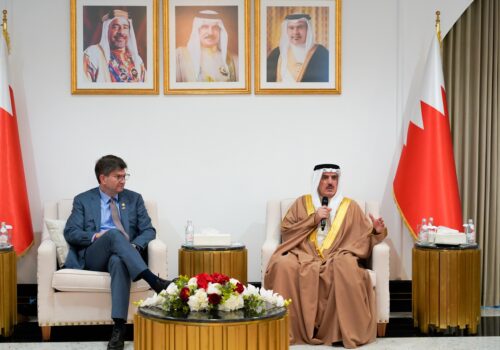What do you think about the role of cyber activities in modern conflicts? It’s fascinating to consider how digital efforts can influence traditional warfare, isn’t it? Let’s take a closer look at the Israel-Iran conflict, particularly how it demonstrates the limited impact of cyber activities amid significant speculation about their importance.

This image is property of www.atlanticcouncil.org.
The Israel-Iran Conflict: A Brief Overview
The tension between Israel and Iran has deep historical and political roots. This conflict has evolved with the times, leading to modern tactics that include not just military operations but also cyber warfare. Understanding the complexity of their relationship is crucial to appreciating the dynamics at play in their cyber activities.
A Historical Context
You might wonder where this conflict stems from. The Israel-Iran rivalry heightened significantly after the Iranian Revolution in 1979, leading Iran to oppose Israel due to Israel’s close ties with the United States. Over the years, various incidents, including proxy conflicts and military confrontations, have marked this fraught relationship, setting the stage for modern cyber operations.
Cyber Activities in the Israel-Iran Conflict
Cyber operations have been a noteworthy aspect of the Israel-Iran conflict. Various forms, from hacktivism to state-sponsored attacks, have been employed, reflecting the strategic narratives both nations wish to project.
Hacktivism: Political Motivation in Cyber Attacks
Hacktivism refers to the use of digital means to promote political agendas. In the context of the Israel-Iran conflict, it has played a significant role, with various groups participating in politically motivated cyber attacks.
Emerging Groups and Their Actions
Numerous cyber groups have emerged, targeting entities they associate with either nation. These actions often draw considerable media attention, leading many to speculate about their real-world effectiveness. However, despite the intensity of these operations, their impact has generally been assessed as insubstantial.
Limitations of Hacktivism
While hacktivist attacks may gain notoriety for their audacity, the reality often reveals a lack of tangible results. You might find the aftermath of such attacks leads to conversations around data breaches or disrupted websites, but they rarely shift the strategic landscape of the conflict in any meaningful way.

This image is property of www.atlanticcouncil.org.
State-Sponsored Cyber Attacks: Chaos Without Objectives
State-sponsored cyber attacks represent a significant escalation in the cyber aspect of this conflict. Israel has notably targeted key Iranian institutions, aiming to disrupt their operations and create internal instability.
Example Attacks
Two prominent examples include:
- Bank Sepah: This Iranian state bank faced cyber attacks aimed at crippling its financial operations.
- Nobitex: An exchange platform that was also targeted, demonstrating an approach that disrupts economic stability.
Assessing the Impact
Despite their intensity, these cyber attacks have often resulted in chaos rather than achieved any military objectives. The real-world consequences of these strikes tend to affect everyday citizens, raising questions about the ethical implications of such tactics.
Real-World Chaos: Unexpected Consequences
When you look at the aftermath of cyber attacks, you might notice an array of unintended consequences, including increased paranoia among citizens, disrupted economic activities, and diminished public trust in governmental systems. These ramifications ultimately foster a climate of fear rather than yielding significant strategic advantages for the attacking nation.
Information Control Tactics: Disruption over Outcomes
Both Israel and Iran have employed tactics to control the flow of information during conflicts. You might find it fascinating how these measures often focus more on disrupting daily life than achieving specific military aims.
Iran’s Internet Blackout
One of the more notable tactics used by Iran has been the implementation of extensive internet blackouts. These blackouts serve as a means to silence dissent, control public reaction, and maintain a narrative beneficial to the government.
What It Means for Ordinary Citizens
For those living in Iran, this disruption can be isolating and challenging. It prevents people from sharing information, connecting with the world, and even accessing basic services or news. The impact of such measures often creates a sense of discontent among the populace.
Israel’s Restriction on Foreign Media
Conversely, Israel has restricted foreign media coverage, aiming to control how the conflict is depicted globally. This media management tactic seeks to shape international perception, but it often sidesteps the reality and complexities of the situation on the ground.
Consequence for Global Viewers
For you, as a global citizen trying to understand these events, such restrictions can lead to misinformation and a skewed view of the happenings in the region. It’s crucial to examine multiple sources to get a well-rounded perspective amidst the information control.

This image is property of www.atlanticcouncil.org.
Spyware: The Shadow War
The use of spyware in the Israel-Iran conflict has raised serious concerns about privacy, surveillance, and security. Both nations have been accused of engaging in spying activities, often targeting each other’s military and government sectors.
Accusations and Surveillance Efforts
Notable incidents have emerged where accusations of espionage have surfaced. For instance, Israeli intelligence operations have reportedly focused on significant Iranian figures and institutions.
Ambiguity in Effectiveness
Despite the emphasis on espionage, the effectiveness of these activities in achieving military objectives is often ambiguous at best. You might recognize that although espionage can provide insights into enemy plans, the direct implications for military strategy can be less than clear.
The Broader Information Environment
Cyber activities in the Israel-Iran conflict demonstrate how digital operations can influence the broader information environment. Rather than a decisive advantage on the battlefield, these practices often help shape perceptions and narratives.
Impacts on Ordinary Citizens
In many instances, the impacts of these cyber operations are felt more profoundly by everyday people rather than military leaders. You can imagine how civilians bear the brunt of disruptions, whether through internet shutdowns, heightened surveillance, or economic instability.
Shaping Narratives
Both nations’ efforts in cyber activities often aim to control how conflict narratives are presented and interpreted. As a result, public opinion can be swayed, narratives shaped, and conflicts defined in ways that serve national agendas.

This image is property of www.atlanticcouncil.org.
Future of Cyber Operations in the Israel-Iran Conflict
Looking forward, you might wonder what the future holds for cyber operations in this conflict. The historical patterns indicate that these activities are unlikely to diminish; rather, they will likely evolve.
Trends in Intelligence and Reconnaissance
Future cyber operations are expected to focus primarily on intelligence and reconnaissance rather than direct military confrontation. This shift illustrates a move towards gathering information that can lead to advantages in other areas, rather than outright cyber warfare.
Historical Patterns
Historically, both Israel and Iran have adapted their strategies based on lessons learned from previous engagements. As technology advances, it’s essential to anticipate how these adaptations might play out in the upcoming years.
Conclusion: Final Thoughts
The limited impact of cyber activities in the Israel-Iran conflict provides valuable insights into the complexities of modern warfare. While these digital tactics often garner attention, their real-world influence appears constrained, serving instead to shape narratives without achieving decisive military objectives.
Encouraging Awareness
As you reflect on this topic, consider the broader implications of cyber warfare on global politics, daily life, and societal norms. The results of such operations can reverberate well beyond military calculations, often impacting the lives of ordinary citizens in profound ways.
Understanding the nuances of cyber activities in regions of conflict fosters a greater awareness of the challenges posed by modern warfare. As technology continues to evolve, staying informed about these developments becomes increasingly crucial for everyone.